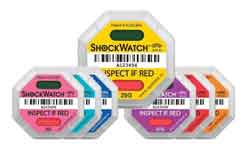Below are three of the top stories in automated data collection, RFID and the Internet of Things in recent weeks.
Did You Stick with Impinj Stock?
We periodically follow the fortunes of the stock of Seattle-based Impinj, the largest US maker of RFID chips and readers – and it's been a wild rise since the company went public in 2015.
Supply Chain Digest Says... |
 |
| In nearby Carmel the suspect walked to the toy aisle, picked up a Lego Star Wars set worth $169, slapped a fake bar code on the box and checked out for just $20 |
 |
What do you say? |
| Click here to send us your comments |
 |
| Click here to see reader feedback |
|
|
But if you've held on to the stock from the beginning, or bought shares in 2018 when the stock tanked after some big quarterly losses, you've make out very well.
Nov. 5, Impinj posted relatively solid numbers for Q3, with revenues up 19% versus 2018 to $40.8 million. It also narrowed its loss in a GAAP basis to $4.1 million in the quarter, down from $7.1 million in Q3 last year. One a per share non-GAAP basis, it earned nine cents, versus a loss of five cents a share in 2018.
That kept the stock price humming, up 54% or so far this year. It rose more than 7% after the Q3 earnings call.
All that before Impinj releases its new M700 tag technology, which the company says will bring new levels of performance in a smaller form factor. Announced in March this year, Impinj says it will beginning making M700 chips in Q1 2020.
New Shock Monitoring System Tracks Damage in Transit
There have been a few takes on this idea before, but a Dallas-based company called SpotSee has released a new RFID device designed to track damage through the supply chain and identify affected inventory.
Called ShockWatch RFID, the system uses a small octangle-shaped plastic casing, into which is placed an impact sensor and RFID tag. The tag can then be read and communicate to ceck hif there have been any drops or other impacts that exceed set tolerances.
(See More Below)
|
CATEGORY SPONSOR: SOFTEON |
|
|
| |
|
|
That data can be fed to supply chain or other enterprise systems, or displayed on a Cloud-based application from ShockWatch.
The company says the devices also have a visual indicator that identifies what products have incurred heavy impacts, simplifying the inspection or audit process.
Each ShockWatch is designed for single use, versus previously released devices that could be reused, though probably at much higher costs. Pricing for the ShockWatch devices was not provided.
New Record for Bar Code Fraud?
We've reported several times in the past on various scams often referred to as "bar code fraud." It involves applying UPC bar code labels for items in a retail store that cost very little on much higher priced goods, buying that item for the low price, and then either returning the item to the store for a refund at the much higher real amount or selling the items on the web or other channels.
Some of these frauds turn out to be pretty large crimes over time. We remember seeing crooks caught that involved hundreds of thousands of dollars of illicit gains over time, but a thief in Carmel, IN may have taken the cake.
Police say an Indianapolis man is now accused of running a $1 million shoplifting scam and is behind bars after committing the from at mostly Walmart and Target stores.
The huge amount of dollars involved comes because the scheme appears to have been going on for at least 10 years.
Police said at a Target store in nearby Carmel the suspect walked to the toy aisle, picked up a Lego Star Wars set worth $169, slapped a fake bar code on the box and checked out for just $20. That's a pretty health margin.
In another example, the man bought a $200 Sonicare toothbrush at Walmart for just $24.97. Then he sold the same model on eBay for $122.50, profiting $97.53 from just that one sale.
The affidavit showed that the suspect's eBay account called War Electronics received in excess of $1.1 million since it was created in 2010.
Prosecutors believe Walker sold 302 sewing/cutting machines, 285 electric toothbrushes, 233 Lego sets and much more from March 2018 to March of this year.
Any reaction to the stories in this week's roundup? Let us know your thoughts at the Feedback section below.
Your Comments/Feedback
|

